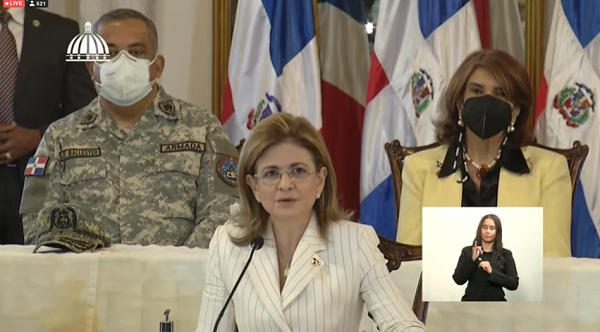
President Luis Abinader says the Dominican government is in conversations with Colombia and Panama to set up a Latin American manufacturing center to not be affected by a situation like the present Covid-19 vaccines scarcity. He said the country does not want to have to depend on foreign entities again in the future.
President Abinader blasted wealthy countries. He said that the allotments of Covax Facility and Pfizer and AstraZeneca vaccines that should have arrived in January and February are delayed because the Dominican allotments have been diverted to wealthy countries. The President Abinader complained: “There has not been the solidarity of wealthy nations. It has not existed. We have had to take other actions. We have not asked for free vaccinations, but did not expect that they would block our access to these.”
President Abinader explained that contracting the vaccines has been a priority since day 1 of the government. Yet, he explained the country could not contract vaccines that the manufacturers had not approved in their country of origin. He said early on, a group of businesspeople headed by Rolando Gonzalez Bunster made contact with Oxford-AstraZeneca and donated US$8 million for the first purchase of these vaccines. The government early on signed for the Covax-WHO facility. President Abinader said those vaccines should have arrived in January and February, but didn’t. “In this process there has not been the required solidarity of the wealthy countries. This has not existed in this crisis,” he lamented.
Abinader said the government had to take other actions and that is how under the sponsorship of AstraZeneca it has purchased the vaccines manufactured in India. He did not detail the cost of the vaccine in the press conference held on 15 February 2021. “The most expensive vaccine is that which doesn’t arrive,” said the President. He said the government purchased 768,000 doses of the Coronavac/Sinovac vaccine from China at US$21 each dose. He said the Chinese government has donated 50,000 doses of this vaccine. This compares to the US$4-US$6 per dose cost of the Oxford-AstraZeneca vaccine.
President Abinader said the first to arrive should be the batches from the 110,000 doses purchased from AstraZeneca manufacturer in India. These will complement the 768,000 Sinovac/Coronavac vaccines from China for applications to those in Phase I of the vaccination plan that are also expected to be of the first to arrive. This is primarily for the frontline medical staff, the army, police staff, and teachers and seniors older than 60+ and persons with pre-existing serious health conditions.
President Abinader said there have been talks to allow the vaccine to be manufactured in the country. He said there is not the capacity at present, but the local pharmaceutical companies could install the needed machines to manufacture the vaccines to meet the country’s demands. He said the Dominican Export Bank (Bandex) is looking into financing pharmaceutical companies so these can meet the local demands for biological medicines in the future and have capacity to export these as well.
Vice Raquel Peña said the country is looking into producing here the vaccines the country needs as part of the Expanded Vaccination Program (PAI). PAI encompasses 17 regular vaccine plans for children and adults. The Vice President said 10 days ago the Pontifical Madre y Maestra University inaugurated a molecular biology lab where vaccines can be manufactured. She said the equipment was donated by Dominican businesses.
Follow the story:
Press conference
15 February 2021

